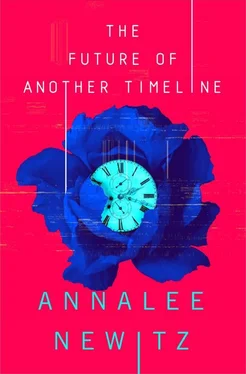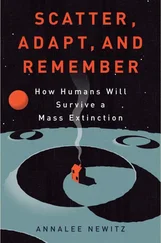“They are… potentials. Discarded versions. Unseen by the narrative force.” Morehshin’s powers of translation were failing her.
I tried to explain. “In a way, there are many timelines. But only one exists in our universe. The others are possibilities. Every time we change history, it’s as if we pull a segment from one of those other timelines into our own. The more we edit, the more our timeline becomes a patchwork. That’s why travelers remember so many different timelines. Each of us recalls the timeline before we made our changes. Every traveler has a slightly different patchwork in our memories.”
“Sometimes very different,” Morehshin said.
“Rarely.” I was firm. “Some people still believe the timeline can’t be changed at all.”
Soph widened her eyes. “But there’s so much evidence… all your memories.”
I thought about conferences where senior faculty denied the existence of a timeline where abortion was legal. It was our word against theirs, and they had tenure. “Soph, it’s… very hard to prove scientifically that something happened in a previous edit of the timeline. Even if there’s evidence in the archive caves. Like Morehshin said, it could all be lies. Some people believe that travelers like us invent fake memories to undermine the current version of history. That’s why we have to believe each other.”
Morehshin nodded. “What I read by Anita in the subalterns’ cave was true.”
Soph stared into the distance, where birds scooped scraps out of a fountain with awkward grace. “Have you ever wondered whether there might be multiple timelines that are real? Maybe each time you change history, you’re diverging into a new timeline and leaving your sisters behind in the old one, where they have to… to fend for themselves. Alone.” Her eyes flashed with anguish. “After all, a universe and a multiverse look the same from where we’re standing.”
I put my arm around her reassuringly. “There is only one timeline. Geoscientists have ways of expressing it mathematically, but another way of putting it is that the Machines are like… threads. They sew swatches together into a single quilt.”
Morehshin said nothing. She was staring morosely at something in the cobblestones below her feet, and no matter how hard I tried, I couldn’t figure out what it was.
Irvine, Alta California (1993 C.E.)
I knew it was going to happen eventually. I came downstairs to dinner barefoot, and my father reached up from his chair to grab my arm so hard I gasped.
“Get back upstairs and put your shoes on! We always wear shoes downstairs!”
It was useless to protest. Still, I couldn’t help looking over at my mother—I was always hoping that one day she’d notice that something seriously weird was going on. She was reading a book about intersectional education and completely ignored us. As my father glared, I wondered if anyone but me would ever question the blissful domesticity of this scene. I could smell something peppery cooking on the stove, and the table was set. Early evening sunlight tumbled through the orange tree in our backyard, and a cat walked furtively across the cinderblock fence that divided our property from our neighbors’. Everything was relentlessly normal, right down to the hum of the air conditioner.
Maybe I was crazy to think anything was wrong. But my arm stung and my dad was pretending that we had always worn shoes downstairs and I couldn’t believe that my mom didn’t know or care. I thought of saying something casual to her, like, “Remember how yesterday dad said our shoes would contaminate the rug?” Then I thought about screaming until every piece of glass in the kitchen was reduced to shards.
I stood for a few seconds longer, wishing she would at least look up and acknowledge me. Nothing. Either she was genuinely engrossed in her book, or she didn’t want to deal. I wasn’t sure which was worse.
“Well? Where are your goddamn shoes, Beth?” My father crossed his arms.
I walked to the foyer and grabbed my sandals. But then I didn’t feel like stopping. Without thinking, I opened the door and left the house. I walked quickly out of our cul-de-sac, rounding a corner onto the path that led to the community pool several blocks away. I wanted to be long gone by the time my parents realized I’d left. It’s not that I hadn’t broken rules before, but usually I was secretive about it. I never openly left the house without their permission. Especially not when my father had just yelled at me.
It felt like I’d passed into another reality where rules no longer existed. My sandals slapped the sidewalk in a satisfying rhythm and I could hear distant splashes and shouts from the pool. A group of middle school kids yelped and shoved each other in the water. It was the same thing I would have done the summer I was twelve, waiting through the long weeks that divided my elementary school kid self from what I was certain would be my completely grown-up middle school self. I had been such a conformist back then. I filed my nails into perfect parabolas and wore tiny bathing suits, and squeezed lemon juice onto my head in the hot sun to bring out the blond streaks in my hair. I wore pearls with my preppy blouses and was absolutely convinced that if I could lose five pounds, I would finally be pretty. But then Lizzy and I discovered punk rock.
The girls in the pool were squealing and despite the distance I could see that they’d all used the same cherry red nail polish on their fingers and toes. I used to share nail polish with Lizzy too. My nostalgia sublimed into generalized melancholy as a train howled by outside the neighborhood boundary wall. It occurred to me that this might be the last time I’d have a chance to walk by the train tracks before I went to college and became an actual adult.
I turned my back on the pool and scaled the wall, curling my bare toes into the crumbling stucco footholds before launching myself over the top. I hit the dusty ground with a shock that traveled up my legs to my lungs. I could still see the diminishing train in the distance. It was one of those freighters full of endless rectangular cars that might contain anything: produce, animals, toxic chemicals, stowaways. There wouldn’t be another train for a long time, so I crunched over the rock bed beneath the tracks and sat down on a thick, sun-warmed rail. Idly, I wondered where the rocks came from, and turned one over in my hands, studying reddish streaks on slate gray. Probably basalt, a volcanic rock packed with minerals that oxidized into a pinkish rust. I tossed it back among its rough-cut brethren. Some volcano spewed hot, gelatinous blobs millions of years ago, and humans eventually brought the results to this anonymous stretch of railroad track in Irvine, Alta California.
The clatter of footsteps brought me out of my reverie, and I looked up to see Lizzy walking on the tracks toward me. She stopped about twenty yards away, Walkman clutched in one hand and a lit cigarette in the other. Of course she was here. It was where we always went. She exhaled a long plume of smoke and waved tentatively.
My heart was vibrating so hard it was like I was standing next to an amp during a drum solo. Were my teeth chattering? I bit down hard and stood up. More than anything, I wanted to talk to Lizzy—the old Lizzy, before the murders, when we identified rocks and swapped mixtapes. It had been months since I’d seen her, and longer since we’d said more than hi in the halls. I was about to leave Irvine forever. Maybe we could talk this one time. Maybe everything could be normal again—not normal like in my dad’s house, but truly normal, like in a Judy Blume book about how it’s really hard to go through puberty but we survive it and then everything’s fine.
Читать дальше








![Аннали Ньюиц - Автономность [litres]](/books/424681/annali-nyuic-avtonomnost-litres-thumb.webp)



